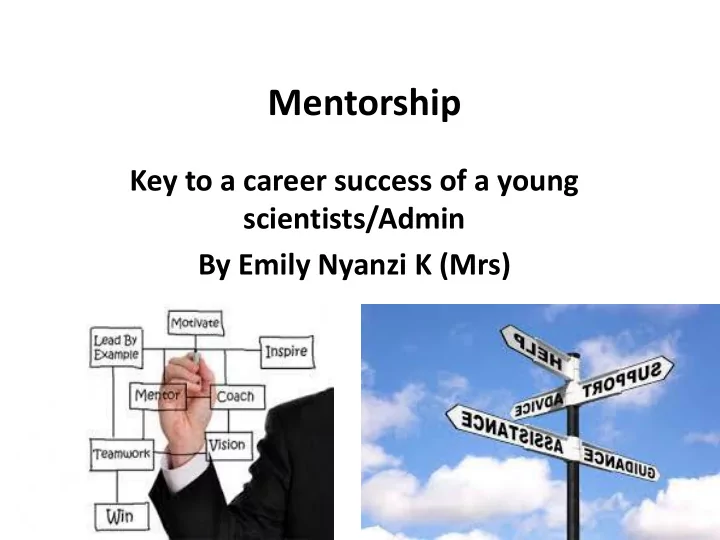

Mentorship Key to a career success of a young scientists/Admin By Emily Nyanzi K (Mrs)
Mentorship? • Definition • Why/Role of mentorship • Qualities of a good mentor • Coaching Vs Mentorship • Xterics of good mentorship programme
Definition • Mentorship It is a personal developmental relationship in which a more experienced or more knowledgeable person Helps/guides a less experienced or less knowledgeable person. • The Person giving this guidance is a Mentor • The person in receipt of mentorship may – Mentee/apprentice • Teach, Coach, Counsel and Encourage
Why Scientific Mentorship • Mentorship • Mentorship provides the student with guidance by an established investigator in: • Applying scientific principles • Developing an experimental design and ; • Conducting research with integrity.
Role of Scientific Mentorship • A mentor provides opportunities for networking and collaboration. • Mentors balance positive reinforcement and encouragement with a healthy dose of constructive criticism and scientific skepticism when discussing data. • A mentor makes informal appraisal and monitor the growth of the • mentee in critical thinking and research skill building .
Qualities -1 A good mentor i. exemplifies what the young researcher wants to do ii. Aligns his interest with that of the mentee. iii. Will also offer perspective on professional development iv.The research-funding process
Qualities-2 (Finding a Mentor) An ideal mentor should • have “pull” i.e. He/she is well established • credible in their field • take a personal interest in the junior researcher's skills and professional development. • Search for information on your potential mentor ( research area, funding etc.) and • use info to decide if he can provide the path you wish to travel
Coaching versus Mentoring Coaching Mentoring Coaching may be informal • Formal; the line manager is not the mentor but informally may Relationship crosses job choose to do boundaries • – Professional development- focused • Interest of the mentor is personal to provide professional support • Relationship may be initiated by Mentee
Mentee- what you should know Self-marketing in approaching a Mentor-be concise (elevator talks) • Learn the ability to describe your own research within 5 minutes: • be proactive and be honest to describe • Who you are • What you do • What you have achieved in the context of the field • Where your work can lead to • Show excitement, confidence and enthusiasm about your work and • what you want to do for the future: • -Showcase your hard work by highlighting your accomplishment in context • -Engage the potential mentor for guidance
Components of a Good Scientific Mentoring Program/scheme 1. F ocuses on helping to build the mentee’s career – a natural consequence to support for life.
What Constitutes a Good Scientific Mentoring 2. Personal characteristics Passion, enthusiasm and positivity / Appreciate individual differences - Respect - • Treat all with high regard in order to inspire confidence
What Constitute Good Scientific Mentoring Unselfishness Share your own ideas and show delight in seeing others succeed-no intellectual jealousy • Do not use your mentees to promote your own scientific standing
What Constitute Good Scientific Mentoring 3 . Teaching and Communication • A mentor should learn to be an exemplary teacher • Learn to communicate to diverse audience • Train your students to communicate
What Constitute Good Scientific Mentoring Mentees should make use of scientific conferences • Ideal venues to develop confidence in presentation skills, for educational and professional growth and networking. • Research the speakers and conference topics to allow you participate constructively • Attend conferences with the mindset to learn, not just to present. • Do not be a ‘social butterfly’: Focus on particular people
What Constitute Good Scientific Mentoring Further on............... your strategic development • Decide on what You believe you should do and seek support to do it Further your own agenda rather than changing your agenda to fit the funding opportunities • Clearly play to your strengths and avoid trying to compete where you are weak • Ensure your science REALLY MATTERS : “Trivial problems may be just as hard to solve as important ones; therefore always work on important problems”
Further reading….. Nature’s Guide for Mentors) Nature Vol. 447:791-797; June 2007
Thank You
Recommend
More recommend